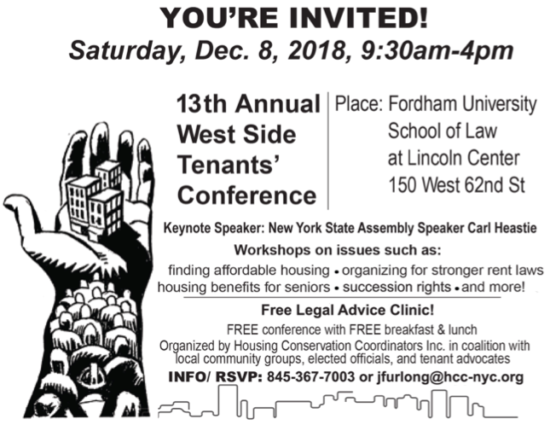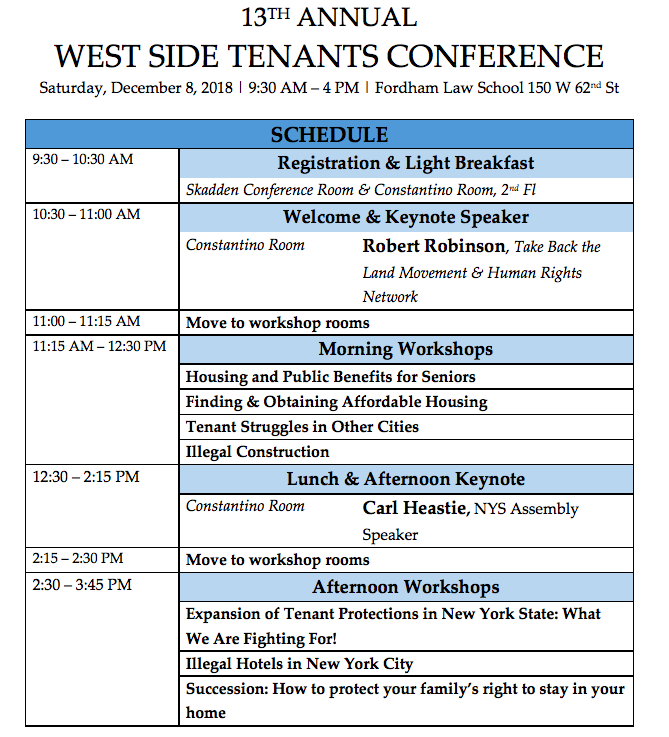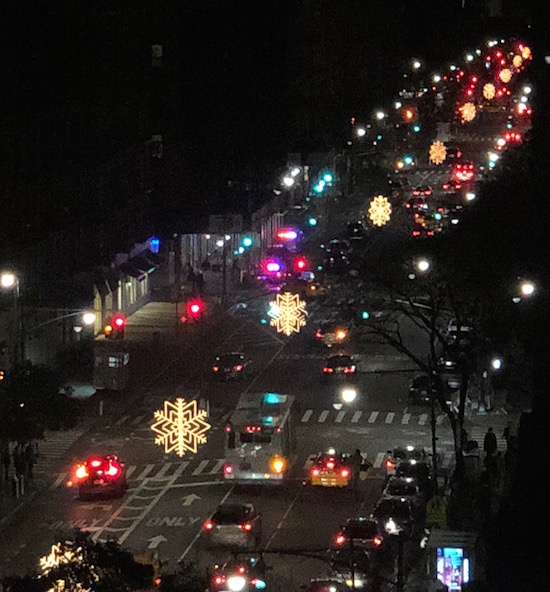Renters can get free legal help and learn about new laws meant to help them stay in their homes at a conference on Saturday at Fordham Law School. The 13th annual West Side Tenants’ Conference runs from 9:30 a.m. until 4 p.m., and the keynote speaker is Carl Heastie, the Speaker of the New York State Assembly.
The city has expanded access to legal counsel for people facing eviction after advocacy by local Council Member Mark Levine, along with other new laws. And rent laws could be expanded in the next session in Albany, because Democrats control both the Senate and Assembly for the first time in 10 years. See the agenda below.











I got a laugh from the workshop “Succession – How to protect your family’s right to stay in your home”.
So if you live in a rent-regulated apartment and your son becomes wildly successful and wealthy he still gets to stay in this apartment for the same ridiculously low rent?
(And I happen to know a situation like this).
It’s no wonder NYC has a housing affordability issue and it’s pathetic that these lefty politicians enforce this unfair and discriminatory policy.
PS I appreciate UWSSurfer’s remarks above. He is accurate about what is going on with many thousands of rent stabilized on the UWS — harassment from landlords, threats to throw them out on the street, fear.
Every time there is a forum or event on this subject, hundreds come out. It is one of the most important issues in the community, very closely linked to affordable housing. And yet — little or no coverage in the WSR. When was the last time there was an interview with a tenant advocate, or tenant leader?
Or, heaven forbid, how about coverage of a homeless advocate, or someone giving services to formerly homeless?
I’m not laughing. Many of us know elderly rent-stabilized tenants who are being harassed by their landlords.
Anna Gago, the housing attorney who works out of Helen Rosenthal’s office, says that she gets 30 calls a day from frightened rent-stabilized tenants who are being harassed by their landlord using dirty tricks and scare tactics.
This seminar is a welcome event for the hundreds/thousands who live in fear— including
domestic partners, gay and lesbian spouses,
and other family members.
Sherman, you seem to be an angry and bitter guy.
there are so many things wrong with what you wrote, it is hard to know where to start, and impossible to set everything straight in such a short space. the bottom line is that you don’t seem to have empathy or understanding of seniors on rent stabilization.
I’ll focus on just one factual point. Sherman said:
“People like me have to subsidize them every time my monthly maintenance is jacked up but their rents can’t be touched. This has caused raucous arguments at shareholder meetings.”
I don’t know if you live in a condo or coop. I live in a condo, so I know how it works very well. From perusing the NY State AG’s site, it seems to me that coops work the same way.
in condos, and as far as i can see in coops, someone OWNS the apartments (or if a coop, the shares) that the rent-stabilized people are living in. that person or corporation, usually a large real estate investor, is called the “holder of unsold units” or sometimes “the sponsor.”
the tenants in the rent stabilized apartments pay their rent to the owner of the units or shares. The owners pays maintenance fees on the units or shares in exactly the same formula that you do. when your maintenance goes up, theirs does as well, by the same percentage. You are not subsidizing anyone.
the rent stabilized tenants, unless they are low income senior who qualify for SCRIE (senior citizens rent increase exemptions), or disabled who qualify under a similar program, have to pay regular rent increases, similar to all rent stabilized tenants. if they have been living there since 1970 (i imagine very few), they have to pay similar rent control increases.
usually, the “holder of unsold units” bought the units at .25 cents to the dollar or less. their business model is to wait for the tenants to die, or perhaps to force them out in various ways. it is a nasty business model and an unpleasant business, attracting unpleasant people. But the investor makes a financial killing when the tenant finally does move out or dies, as they can then sell the unit for whatever they can get.
if your building operates in a different way, particularly if it a coop. i would appreciate an explanation. I understand that there can be variation within NY State regulations.
the fact that you say there have been “raucous arguments” at shareholder meetings leads me to believe that some or all of the other shareholders find your false arguments as distasteful as I do.
finally, when you are so far off on facts it makes me question some of your anecdotes, such as the one about the rich son who inherited the rent stabilized apartment, or all these rich elderly people living on rent stabilization. Sure, there might be some of that, though rent stabilization has income caps. but my antenna senses gross exaggeration on your part, in order to grind your political axe.
Hi Bruce
You note that you live in a condo.
You don’t mention that you bought your condo for peanuts in an inside deal after spending decades paying pennies in rent.
Present all the facts before you attack me.
Sherm
Sherman,
I notice that you didn’t dispute my key point, which is that you fabricated the issue of the rent stabilized tenants not paying their fair share in coop / condo maintenance fees, and that your claim that you are “subsidizing” them is 100% bogus. ranting about this might somehow make you feel good (I can’t imagine why), but there is no truth to it.
it turns out that your real complaint seems to be anger and jealousy because the rent-stabilized tenants pay less than you.
now, as to your question. Sherman said:
“You don’t mention that you bought your condo for peanuts in an inside deal after spending decades paying pennies in rent.
Present all the facts before you attack me.”
You are woefully misinformed about both rent stabilized tenants and about the condo conversion process. It would have benefited you if you had attended the affordable housing conference featured in the original posting.
And it’s indeed interesting that living in affordable housing on the UWS is regarded by you as a BAD thing. in your mind, oddly, it’s immoral NOT TO pay exorbitant rates to landlords and/or the bank (the mortgage holder).
but i don’t mind providing facts, if only because they might be slightly useful for others who are going through the condo conversion process. Facts about our condo are public record, anyhow. And i never mind showing how off base you are.
As a rent stabilized tenant on the UWS for approx 15 years, i hardly paid “pennies.” I wish i had. My small one bedroom was well over $2,000 a month in rent when it went condo and I bought it; if i had stayed as a rent stabilized tenant, it would be in the high 2000s now, with the every-two-years increases. hardly pennies, but less than the insane rates being paid by the “market rate” tenants.
but if people have better deals, more power to them. What is your beef with seniors and working class people living in affordable apartments?
When our building went condo, we formed a tenants association to negotiate with the sponsor, and we had some success. It was a hell of a lot of work! Our aim was to benefit ALL classes of tenants: those who wanted to buy, those who wanted to stay as rentals, and those who wanted to leave.
We were able to negotiate a 30% insider discount for those who wanted to buy, albeit the apartments were un-renovated, which watered down the real discount by as much as 10% of the 30%. This was ok, but nothing like the 50-70% insider discounts people were getting in the 80s. i was able to buy, and could not have done so without the discount, but only a small fraction of rent-stabilized tenants were able to do so. If the discount had been 40%-45%, many more existing tenants could have bought.
We also were able to negotiate a 10 year moratorium on MCI (Major Capital Improvement) rent increases for those who wanted to stay as rent stabilized. Sadly, for those who wanted to leave, we would only negotiate a very limited cash buyout.
It’s interesting that you are so offended by people getting together to use their market and economic power to get a better deal. That’s a basic feature of capitalism. Further, you don’t seem to be offended when these rich real estate investors buy apartments occupied by rent stabilized tenants at a 75% (.25 to the dollar) discount, or more.
You and some of your co-thinkers are running a propaganda campaign against the poor, working, and middle class people on the UWS, a very large percentage being seniors. You call them all sorts of names — freeloaders, for example — and do whatever you can to disparage their existence in this neighborhood. I can only imagine how many people are hurt and even frightened when they read your postings.
I’m not laughing either.
In my building I know elderly people who have been living for decades in their apartments for next to nothing. They are retired doctors and lawyers and apparently have plenty of money as they travel and have second homes. They live in apartments that are likely much bigger than anything they need.
People linked me have to subsidize them every time my monthly maintenance is jacked up but their rents can’t be touched. This has caused raucous arguments at shareholder meetings.
These are the types of people Helen Rosenthal and her ilk pander to.
Please explain why this situation is fair and efficient.
If affordability standards were a floor as well as a ceiling A significant percentage of affordable units would be available for those who truly need it.
If a tenant has to pay at least 30-35% of income as rent then as a family gains in income their rent would increase and they’d have less incentive to hold on to an affordable unit.
They could move to a unit they could afford thus freeing up the affordable unit for another qualified family.